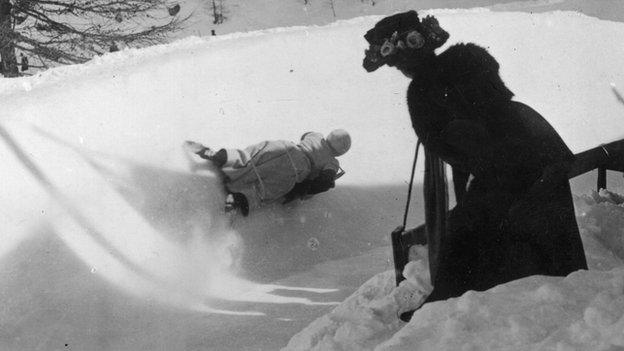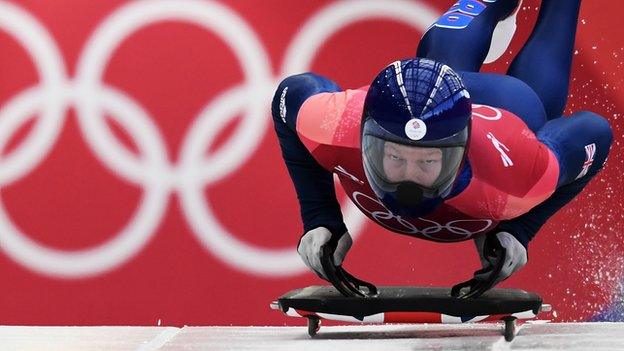Cresta Run: Women allowed to race iconic track in Switzerland
- Published

A woman races down the Cresta Run in the early part of the 20th Century
Women will be allowed to race down the iconic Cresta Run toboggan track in Switzerland this season after an 89-year ban was overturned.
They had been allowed to race on equal terms with men until the 1920s when it was deemed medically dangerous.
However at a St Moritz Tobogganing Club meeting members voted by a two-thirds majority to allow women to ride the Cresta Run again and become members.
"It's a good step forward," GB skeleton racer Jerry Rice told BBC Sport.
"They are moving forward and I agree that it's time for the women to be able to slide like the men. I look forward to seeing women on the run."

Rice finished 10th in skeleton at the 2018 Winter Olympics
The St Moritz Tobogganing Club was founded by British Military officers in 1887.
Rice worked at the world's oldest natural ice run for two seasons and reckons he has hurled himself down the 1,325-yard track up to 200 times.
"I got into Cresta through my dad, who was a member and had been for a number of years," he said.
"I worked two full seasons and I've probably done between 150-200 runs.
"That's how I got into skeleton - someone said to me 'you're pretty good at this, perhaps you should give skeleton a go', so I did."
Rice, who is racing on the World Cup circuit this year, finished 10th at the 2018 Winter Olympics in Pyeongchang, where team-mate Dom Parsons won bronze. Lizzy Yarnold defended her Olympic title in the women's race, with fellow Briton Laura Deas finishing third.
"There are some big differences between the sports [tobboganing and skeleton] but both are similar in terms of how it feels," added Rice.
"You're at the top of a track and about to hurtle down at about 80mph with no breaks and not much protection.
"It's a nerve-wracking experience, just as skeleton is. After a while, you get used to both of them, though."
Women's skeleton and bobsleigh have been part of the Winter Olympics since 2002, with Britain's women winning three golds, one silver and two bronze medals and the men collecting three bronzes.